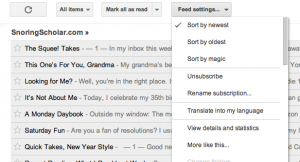Using Facebook and Twitter to Promote Your Blog
Though I have a reluctant relationship with Facebook at best, I’ve come to accept that, many times, Facebook is where I’m going to get readers and interaction.
The people following me on Facebook are, in theory at least, interested in what I have to say on my blog and are invested in me since we’re “friends.”
Today, I thought I’d point out a few ways you can use Facebook and Twitter to promote your blog posts, since your followers/friends in those venues might not take the time to click to your blog or even know that you have a blog they want to read. They also might not want to read everything you write
Here are a three easy-to-use tools that can help you use Facebook and Twitter to get the word out about your blog. They are all very similar in their capabilities and ease of use.
For people who use Facebook (or Twitter, for that matter) like a feed reader, this is an invaluable service. For those of us who don’t, it doesn’t hurt anything.
dlvr.it (pronounced “deliver it”)
I have Jen Fitz to thank for bringing this to my attention in the comments of a previous discussion of traffic. It’s an all-in-one service, including both Facebook and Twitter. You’ll need to open an account with them and then link up your blog feed (for those of you non-technical types, this is usually as easy as just entering the web address of your blog, if you haven’t changed things or set up a feed).
Networked Blogs
This is a popular service that I’ve been using for quite a few years to deliver my blog posts to Facebook automatically. Here’s the way it works: you enter the information and bam! Your blog appears in your Facebook feed. You can also set up a feature called “Syndication” that will let you publish your blog’s feed to your Facebook profile/timeline, any or all of your Facebook pages, and any or all of your Twitter accounts.
Twitterfeed
Much like dlvr.it, Twitterfeed is an all-in-one service. You set up an account, link to your Facebook, Twitter, and blog accounts, and you’re done. You’ll get some stats that are available to you through this, such as how many people clicked through or read from Facebook or Twitter.
If you have a WordPress blog…
It bears mentioning that if you have a WordPress blog (as I do), you can set it up to automatically use your Twitter account and post your new blog material there automatically. I’ve used the Twitter for WordPress and Twitter Tools plug-ins with some success.
YOUR TURN: what questions does this bring to mind? Do you have any tips of your own to share?









